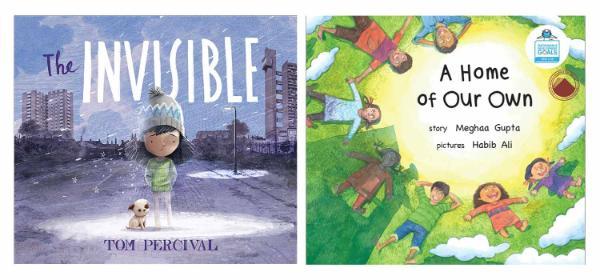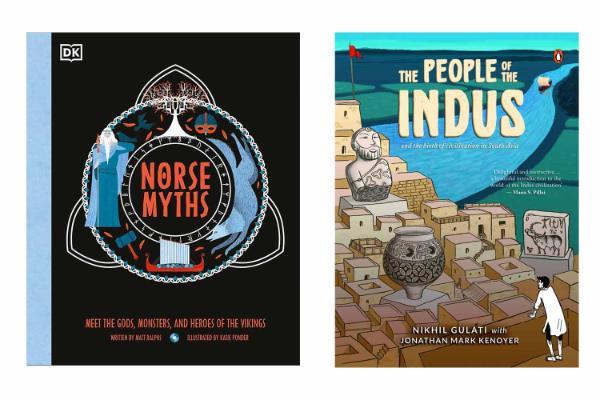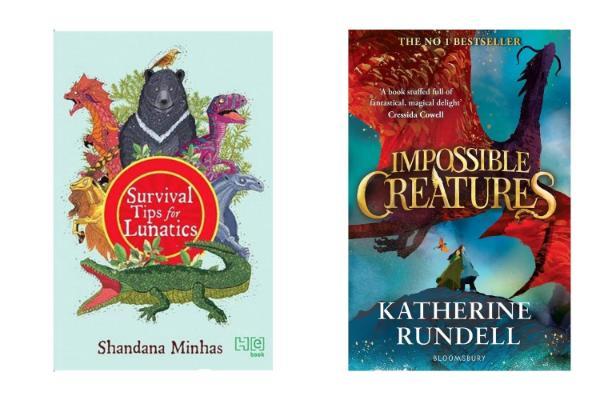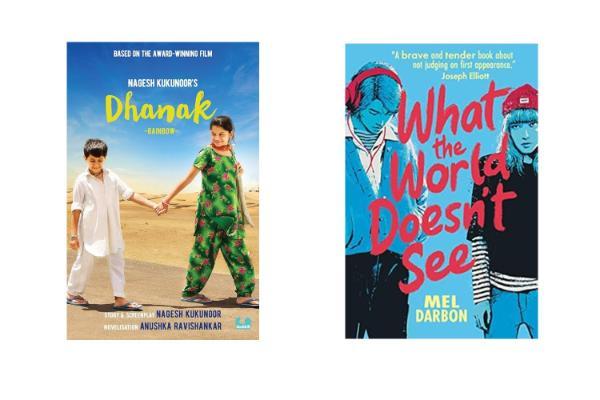Literature Across Borders: third year
This is our third year of Literature Across Borders, a project which pairs students from Bath Spa University with peers at Ashoka University in India. Through the project, trade notes on green books published for young readers in both. Discover what students from both universities learned through their reading and discussions in Year one and Year two.
You can read more about this in LEAF journal, which published two proceeding pieces – the first a series of eight student reflections, and the second a staff summary of how the project was conceptualised, planned and delivered.
Picture bohok pairing: Invisible and A Home of our Own
In our picture book pairing for this edition of the literary exchange, we looked at the treatment of children living in poverty.
Reading across cultures has helped me understand how stories shape childhood experiences differently, yet (they) all centre around core values like kindness, belongingness and resilience.
Zoya, Gargi College
A Home of our own by Meghaa Gupta and Habib Ali, India
“Let’s play house-house!” decide Sunehri and her friends. So, they put together some old plates and bowls, empty packets of chips, plastic bottles, a broken helmet… things they’ve collected going about their work in the city on whose streets they live.
The game loved by children everywhere takes on a poignant layer when played by those who have never known a home. Pictures full of exuberance and detail bring out their spontaneous joy in a make-believe world, which trips side by side with the harsh reality of their lives.
The Invisible by Tom Percival, UK
From the author of Ruby’s Worry, this is a powerful story that shines a light on those that feel invisible in our world.
Meet Isabel. Her family don’t have much, but they are getting by. Until one day there isn’t enough to pay their rent and they have to leave a home filled with happy memories to live on the other side of the city. This is a story of a girl who goes on to make a difference – because we all belong.
Student discussion
I’ve got a 7-year-old and it was very interesting, seeing her response to it as well, because it was portraying poverty in a way that neither of us had seen before, and yet there was so many similarities with the children and the way that they behaved and the community that they had developed together, that I see in children in the UK as well.
Hannah, Bath Spa
For the full conversation, the student dialogue is hosted on the Literature Across Borders YouTube channel.
The dialogue is moderated by Pooja Kadaboina, an alumna of LaB, who has an MA in English from Ashoka University, one of our partner universities in India, and is currently a Deputy Editor at Perky Parrot, the children's imprint of Niyogi Books in India.
The participants are as follows:
- Devanshi Deva is pursuing a BA in Elementary Education at Gargi College, Delhi University.
- Zoya Waseem is also pursuing a BA in Elementary Education at Gargi College. She calls herself a literary explorer, traveling through thoughts and ideas. A reader and storyteller, Zoya believes stories are bridges that connect hearts and spark change.
- Hannah Durkan is pursuing an MA Writing for Young People at Bath Spa University. She is a children’s author from Leeds in the UK. Hannah enjoys writing fantastical adventures, including her middle grade series, Zeina Starborn.
Illustrated non-fiction: Norse Myths and People of the Indus
In our second pairing we looked at how past lives are pictured in illustrated books.

Norse Myths by Matt Ralphs and Katie Ponder, UK
Action-packed tales of extraordinary creatures and compelling gods, goddesses, and heroes come to life in this collection of beautifully illustrated Norse myths. Readers can explore the stories of mythical figures like Thor, the god of thunder who disguised himself as a bride to seek revenge and retrieve his powerful hammer, Mjölnir, and how Sif, the goddess of fertility, had her long golden hair cut off by Loki, the trickster god.
People of the Indus by Nikhil Gulati with Jonathan Mark Kenoyer, India
Supported by extensive research from a leading Indus archaeologist, this graphic novel is a beautifully illustrated glimpse into the lives of the people of the Indus civilization, dating all the way back to 3200 BCE, and how they changed the course of human history.
We were delighted to facilitate a conversation between authors Nikhil Gulati and Matt Ralphs. To watch the dialogue hosted by Meghaa Gupta, please visit our YouTube channel.
Student discussion
I think if I had read these myths without the illustrations they would not have had the same impact on me. - Ayaan
For this pair we have Ayaan Shariq from Ashoka University in dialogue with Laura-Elizabeth Jacquemond from Bath Spa.
The dialogue is moderated by Suzanne Faria, an alumna of LaB, currently in her second year of the MA Writing for Young People at Bath Spa University.
For the full conversation, the student dialogue is hosted on the Literature Across Borders YouTube channel.
These people had a life that worked for them, and it looks like it would have been maybe even better than having a king because everybody could prosper. - Laura
Fiction pairing one: Passage into imagined worlds

Survival Tips for Lunatics by Shandana Minhas, India
To save the most important things in the world, you have to first find out what they are...
Tip No. 1: Believe it or not a camping trip is the best place to start especially if it has: Changez, 12 (Tip No. 2: Think constable in the lunatic police); Timmy, 10 (Tip No. 3: Think capuchin-monkey brained snotasaurus); A mud volcano (Tip No. 4: Yes, it can erupt!); Saw-toothed crocs (Tip No. 5: The animals, not the shoes); A snippy sparrow (Tip No. 6: Small is Big); The last Ursus thibetanus (Tip No. 7: Think large, furry and walking towards you!); A herd of hyper-herbivorous Baluchitheria (Tip No. 8: Don't think... Run!); One poetic Markhor (Tip No. 9: Yup, get the earplugs); A Proto-litero-dragon (Tip No. 10: It may go from bad to verse!); Vegetarian Velociraptors (Tip No. 11: Be glad you are not green) And as always Assorted pesky humans, including angry soldiers and heartless rogues (Tip No. 12: Think the most dangerous animal on earth...)
Got the idea? Here's a story that tells you what on earth is really happening. If you are a clever Smartosapiens, Survival Tips for Lunatics is the mad, mad handbook for you to make sense of the world and where it is going, besides round and round!
Impossible Creatures by Katherine Rundell, UK
There's a place where all the wildest stories began … Impossible Creatures is written by Katherine Rundell, winner of the Costa Children's Book Award, the Blue Peter Book Award and the Waterstones Children's Book Prize comes the first novel in a landmark trilogy for 9+ fans of His Dark Materials
Christopher finds a passage to the wondrous Archipelago, a cluster of islands filled with mythical beasts. Amidst all the creatures, he meets local girl Mal, who’s in possession of a flying coat and a baby griffin. However, she’s being pursued by a killer. Together, the begin a quest to save the creatures, journeying across the wild splendour of the landscape to save both the islands and world beyond them before it’s too late.
Student discussion
I think the good thing about a fantasy is that it's already a strange world. It's already a setting that you're not expecting to fully know. - Hannah
For this pair we have Mehak Bakhshi from Ashoka University in dialogue with Hannah Robbins from Bath Spa.
The dialogue is moderated by Vagmita, a third-year student majoring in English and Creative Writing at Ashoka University.
For the full conversation, the student dialogue is hosted on the Literature Across Borders YouTube channel.
Even before the narrative pushes both kids to take on an adult role, they constantly emphasise how children are often viewed as naive or unaware of things or use this. But both the characters actively go against that from the very beginning. - Mehak
Fiction pairing two: Siblings coping with disability make journeys of hope

Dhanak by Anushka Ravishankar, India
Chotu is blind, but it doesn’t bother him much. His sister Pari helps him with everything. Besides, she’s promised him she’ll get his eyesight back before his ninth birthday. And that’s just a couple of months away!
Pari is worried. How will she keep her promise? When she sees a poster with Shahrukh Khan, her hero, saying ‘Donate your eyes’, she writes to him, asking him to help Chotu. And then she hears that Shahrukh is in Rajasthan for a shooting! So Pari and Chotu set off on a road trip to meet Shahrukh and get Chotu’s eyesight back.
Through adventure and misadventure and aided and hindered by a cast of bizarre, friendly, colourful and hostile people, the two children traverse across the desert to try to make their dream come true.
What the World Doesn't See by Mel Darbon, UK
Maudie and Jake's family is falling to pieces - their mum's been struggling with her grief since they lost Dad and one night she vanishes. When Jake is put into care, Maudie can't take it any more. She comes up with a wild plan to pull their family back together - by kidnapping Jake. On the run in Cornwall, Jake and Maudie each find something they hadn't expected - freedom and love. But can they find Mum and a way to heal together?
A powerful and insightful novel about grief, disability and first love; a story about getting lost and finding yourself.
Student discussion
The reading experience was a bit like being a part of the creation of a jewel jigsaw, with each scene like a piece that gradually fit together in a satisfying complete whole - Suzanne
For this pair we have Parth Lakhani from Ashoka University in dialogue with Rachael Hammond and Suzanne Faria from Bath Spa.
It was really refreshing as I can't remember the last time I read a book without some kind of preconceived idea of what it would be about - Rachael
The dialogue is moderated by Clare McCarron, who graduated with distinction from the MA Writing for Young People at Bath Spa University in February 2025.
For the full conversation, the student dialogue is hosted on the Literature Across Borders YouTube channel.
When you have a story that's drawing from so many mythical narratives it enlarges the story so it reverberates across cultural contexts - Parth